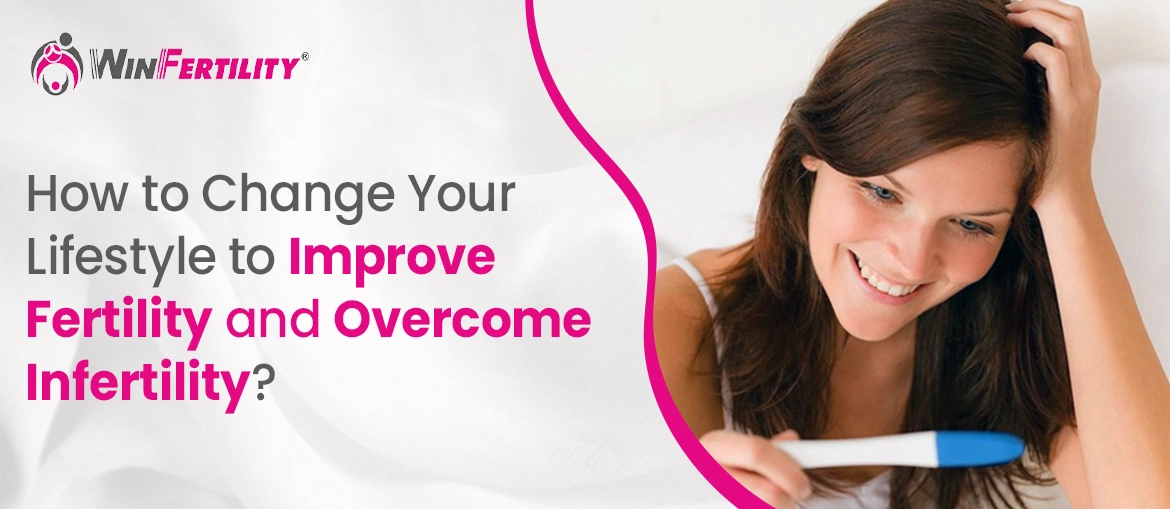
Table of Contents
How to Change your Lifestyle to Improve Fertility and Overcome Infertility?
For both men and women, the solution to fertility includes maintaining a healthy weight, exercising, and consuming foods that support your ability to conceive. Up to 30% of infertility problems are related to extreme weight. The infertility rate is three times higher in obese women. Women who are obese can improve their fertility by just losing 5% of their weight. Sperm-related infertility accounts for up to 33% of male-factor infertility. Fertility issues overall affect up to 15% of couples. There are a few natural ways that can help improve fertility. Some food changes and lifestyle changes can help increase fertility.
Factors impacting fertility:
To be fertile, sperm and eggs should be very healthy. There are various factors that impact fertility; some factors can be changed and some cannot be changed.
These factors include:
- Age: For women, age becomes a factor in the late 30s or 40s, and for men, age starts becoming a factor in the late 50s.
- Eating disorders: What you eat affects your overall health, including reproductive health. Eating disorders, including bulimia and anorexia nervosa, impact fertility.
- Alcohol consumption: Drinking alcohol impacts the fertility status of a person. Alcohol increases the chances of infertility.
- Environmental toxins: Exposure to environmental toxins such as chemicals, lead, and pesticides.
- Overdoing Exercise: Exercise is good for males, but for females, it was found out in a study that more than 3 hours of exercise a week for women reduces the chances of getting pregnant.
- Chemotherapy or radiation therapy: Radiation therapy or chemotherapy reduces fertility rates.
- Weight: The conception rate also depends on the BMI of a person. BMI in the normal range is healthy, but below or above that is problematic.
- Smoking: Smoking is the reason for 13-15% of infertility cases.
Infertility causes for women:
Ovulation is the process in which an ovary releases an egg to meet sperm in order to fertilise. In women, ovulation disorder is the most common cause of infertility.
Factors contributing to female infertility are:
- Endometriosis: A painful condition in which a tissue similar to the uterus lining grows in other places within the abdomen this can be a cause for female infertility.
- Vaginal anomalies: Abnormal structures of the vagina, uterus, and fallopian tubes. Some people even have a double uterus.
- Autoimmune conditions: Autoimmune diseases like celiac disease, lupus, or rheumatoid arthritis.
- Kidney disease: Chronic kidney diseases are known to be related to reduced fertility.
- Sexual dysfunction: Sexual dysfunctions lead to infertility. Approximately 63.67% of women who are infertile are reported to have some form of sexual dysfunction.
- Absence of ovaries: In some cases, there is a surgical or congenital absence of ovaries.
- Infrequent or absent menstrual cycle: There are some conditions in women where they have an infrequent or absent menstrual cycle, like PCOD/PCOS.
Infertility causes for men:
The most common cause of male fertility involves problems with shape, movement, and low sperm count.
- Enlarged veins in the scrotum.
- Genetic disorders such as cystic fibrosis.
- Chromosomal disorders such as Klinefelter syndrome.
- Low testosterone.
- Misuse of anabolic steroids.
- Sexual dysfunction such as erectile dysfunction, anejaculation, premature ejaculation, or retrograde ejaculation.
- Undescended testicles.
- Prior surgical sterilisation (vasectomy).
- Surgical or congenital absence of testes.
- Previous chemotherapy or radiation therapy.
Optimising fertility through lifestyle changes:
Fertility requires sperm and eggs to be very healthy. According to a study, the risk of infertility in women due to ovulation disorders can be decreased.
Ways to boost fertility include:
- Consuming foods that are rich in antioxidants: Antioxidants like folate and zinc deactivate the free radicals in the body, which have the ability to damage both eggs and sperm. So they improve fertility for both men and women.
- Consuming a heavy breakfast: Eating a heavy breakfast may help women who have fertility issues. According to a study, a heavy breakfast helps with the hormonal effects of PCOS, which is the major cause of infertility.
- Avoid unsaturated fatty acids: Consuming healthy fats is important to improve fertility as well as overall health. Trans fats are known to cause ovulatory infertility as they have a negative effect on insulin sensitivity.
- Cutting carbs out of your diet if you have PCOS: For women with PCOS, it is generally preferred to have a lower-carb diet. Many studies have proved that managing carbohydrate intake is beneficial for some aspects of PCOS.
- Consuming more fibre: Fibre helps balance blood sugar levels and helps the body get rid of excess hormones. Certain fibres help remove oestrogen, which is then removed as waste from the body.
- Get energetic: Exercise is very beneficial for your health, including fertility. Increasing physical activity is very beneficial for fertility, especially for men and women who are obese.
- Avoid consuming alcohol: Alcohol consumption has a negative impact on fertility. In a study involving approximately 7,393 women, it was found that higher infertility results were related to higher consumption of alcohol.
- Cutting out caffeine from the diet: Caffeine intake is believed to have a negative impact on pregnant women, but it is also found that consuming caffeine can cause a delay in conception.
To sum up, good nutrition is very important for a healthy body, reproductive system, and getting pregnant. There are many lifestyle changes that a couple can make to have a successful pregnancy and to improve fertility. Many steps can be taken to avoid infertility, as mentioned above.








